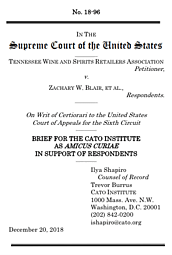Learn more about Cato’s Amicus Briefs Program.
For the first time in over a decade, the Supreme Court has taken a case that could fundamentally alter the way that alcohol is regulated. In Tennessee Wine and Spirits Retailers Association v. Clayton Byrd, the Court will determine whether Tennessee’s durational residency requirements for retail liquor licenses are unconstitutional because they effectively impose a nine-year waiting period on out-of-state individuals and corporations. While the residency requirements for in-state brick-and-mortar retail stores are at the heart of the case, the Court’s decision could have far-reaching effects on shipping by out-of-state retailers. Back in 2005, the Court ruled in Granholm v. Heald that the Constitution’s Commerce Clause prevented states from allowing in-state wineries to ship wine directly to consumers while prohibiting out-of-state wineries from doing the same. Although the Court acknowledged that out-of-state producers were protected against discriminatory and protectionist state laws, it did not reach the question of whether out-of-state retailers were entitled to the same protections.
The Petitioner, Tennessee Wine and Spirits Retailers Association, (“TWSRA”) asserts that the Twenty-First Amendment (which repealed Prohibition) gives states nearly plenary authority to regulate the sale of alcohol in their borders by imposing residency requirements (even discriminatory ones) on retail license applicants. While it surely affords states greater flexibility in devising regulations for alcohol than for other goods or services, the Twenty-First Amendment does not “save” state laws that are blatantly discriminatory and protectionist. When a state law discriminates against interstate commerce or favors in-state economic interests over out-of-state interests, the Court has generally struck down the statute without further inquiry. This fundamental rule stems from the Framers’ concern that, left unchecked, states would enact commercial regulations favoring their own residents at the expense of non-residents. To prevent that type of differential treatment between state residents and non-residents, the Framers adopted both the Commerce Clause and the Privileges and Immunities Clause. As the Court has recognized, the clauses have a “mutually reinforcing relationship” that ensure citizens of their right to access the markets of other states on equal terms.
Cato has filed an amicus brief on behalf of the Respondent arguing that the Commerce and Privileges and Immunities Clauses’ mutually reinforcing relationship unquestionably guarantees citizens’ right to engage in the interstate alcohol trade free from discriminatory and protectionist state regulations. The Tennessee durational residency requirements at issue in the case contradict this central constitutional principle. They effectively impose a nine-year residency requirement that prevent non-resident citizens from competing on the same terms as resident Tennesseans. The only plausible purpose of the onerous requirements is to exclude non-residents from Tennessee’s market, thereby protecting in-state retailers from competition. Left unchecked, states will enact increasingly protectionist regulations aimed at favoring their own residents at the expense of non-residents. The Court has time and again struck down state laws that deprive citizens of their right to access the markets of other states on equal terms. It should do so once more in striking down Tennessee’s blatantly discriminatory and protectionist durational residency requirements.

This work is licensed under a Creative Commons Attribution-NonCommercial-ShareAlike 4.0 International License.
